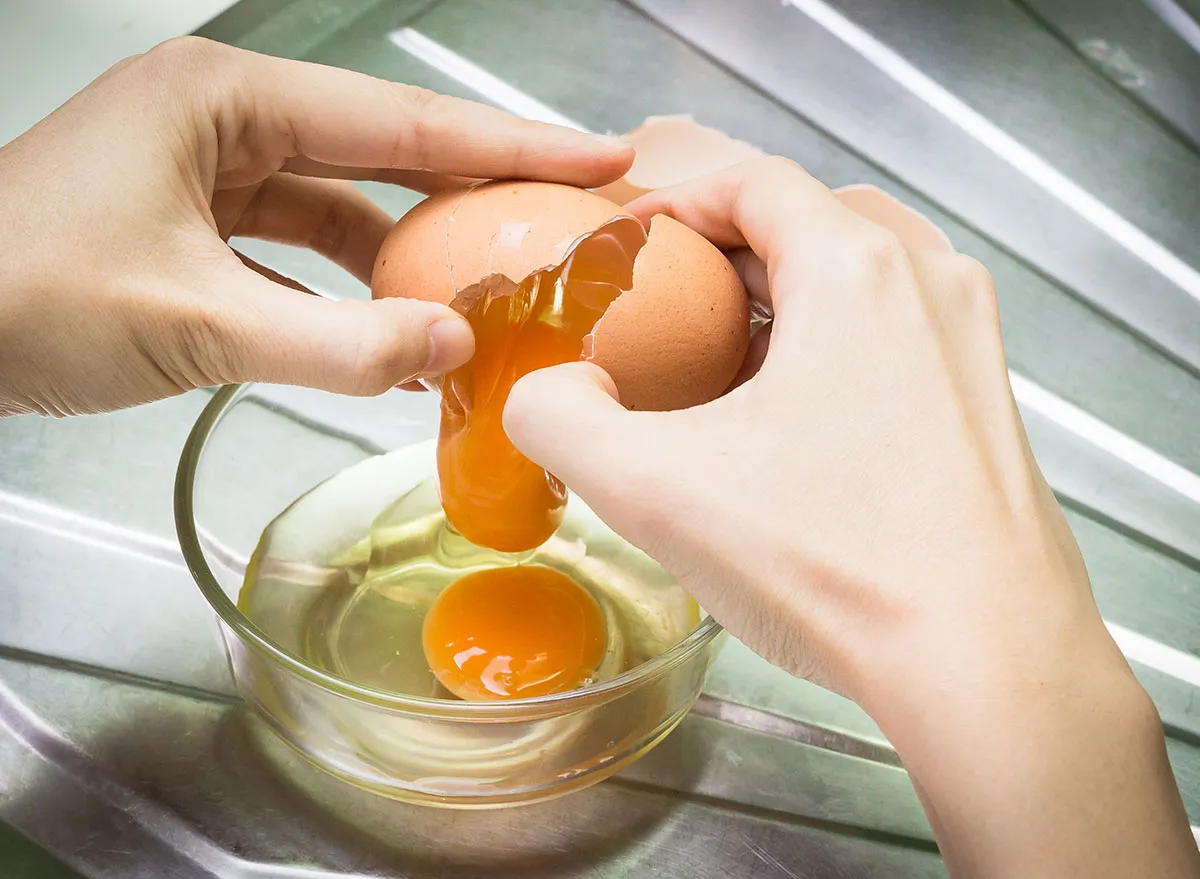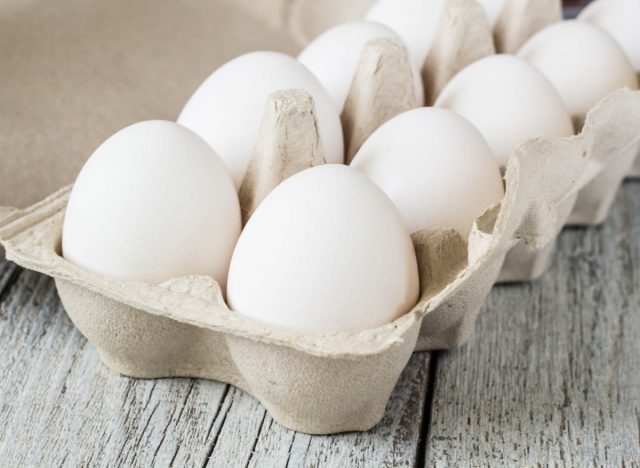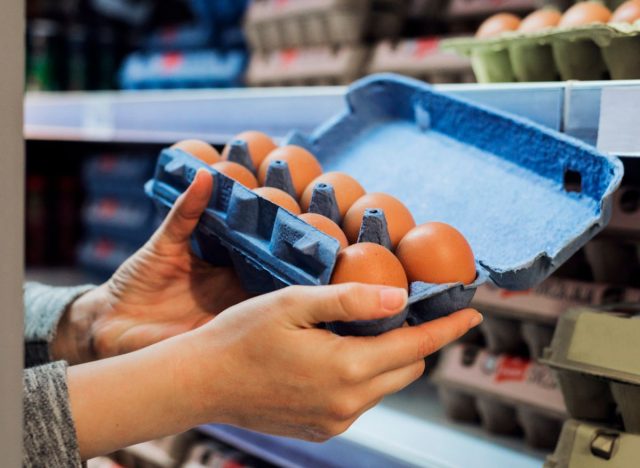The Quickest Way To Tell if an Egg Is Bad—and if It’s Still Safe To Eat

Even if you have the best of intentions to go grocery shopping, plan out your meals, cook as much as possible, and use all of the groceries you purchased, there are still bound to be those moments when you realize you have food that’s about to go bad before you’ve had a chance to cook with it. This can be frustrating with any type of grocery item, but with how much the prices of eggs have skyrocketed in the past year, having eggs that go bad before you can eat them feels like next-level devastation. Thankfully, with the right knowledge and methods, you can know how to tell if an egg is bad, which will not only save you money but will help keep you safe from potential foodborne illnesses.
According to the World Health Organization (WHO), eating spoiled food or food that has gone bad can increase your risk of foodborne illness, which has been linked to over 200 different types of disease. Salmonella is a concern with eggs in particular, which is why people warn against consuming raw eggs in cake batter or cookie dough, eating eggs that have been cracked, or consuming spoiled eggs.
There are multiple ways you can tell if an egg has gone bad, but the one you choose depends on how much time you have and what you feel most comfortable with. The following methods are recommended by chefs and sources like the USDA or FDA, and these tactics are best when combined instead of relying on just one, as combining will ensure the most accurate results. Keep reading to learn their recommendations, and for more tips to help you ensure you’re not only eating well but eating safely, be sure to check out How Long Is Rotisserie Chicken Good For? We Asked the Experts.
Understanding the average shelf life of eggs
A critical aspect of getting the best out of your eggs while they are still fresh is having a general sense of their shelf-life. This shouldn’t be solely relied on because all egg cartons are different, but it can be a good place to start.
The FDA says that compared to protein sources like meat and milk, eggs tend to have a much longer shelf life. In fact, refrigerated eggs in their shell should last between three and five weeks. If you hard-boil an egg, this should last about a week. And if you’re dealing with raw egg whites or yolks outside of the shell, these will only last about two to four days on average.
How to tell if an egg is bad

Use the classic float test
The float test is one of the most classic and commonly-recommended methods for testing whether an egg is still good or not. According to George Zappas, head chef at Cooking Genie, all you have to do is “fill a bowl with water and place the egg in it.”
“Fresh eggs will sink to the bottom, while older eggs will float,” Zappas explains. “This is due to the increasing size of the air cell inside the egg as it ages.”
The USDA says that while an egg that floats is older, it doesn’t necessarily mean it’s gone bad. If you crack the egg open and it releases a funky smell, this can mean it’s gone bad.
Do a smell test and visually inspect the eggs
This may seem like a no-brainer, but one way to always check if your food has spoiled is by smelling it.
“Fresh eggs should not have a smell,” says Zappas. “If an egg smells off or like sulfur, it’s best to discard it.”
Along with checking the smell of your eggs to see if they’ve gone bad, Zappas says you can sometimes tell if an egg has gone bad by using visual clues.
“Crack the egg onto a flat surface,” says Zappas. “The yolk of a fresh egg will be bright and round, and the white will not spread much.”
The USDA also says that any pink or iridescent coloring in the egg, once it’s cracked open, can indicate that bacteria has started to grow. Before you even crack open the eggs, also check to make sure there are no cracks or a slimy consistency on the eggshell.
Check the cooked egg, too
If you’re still feeling unsure after you’ve cooked your egg, you can look for a few telltale signs after it’s cooked.

“If you’ve cooked the egg and still need to know if it has gone bad, you can smell it or observe the texture,” says Amna Muqeem, a home chef and food & kitchen blogger at Ravvy Reviews. “A bad egg would smell odd, and the texture would be slimy or chalky.”
Use the expiration date as a point of reference
It’s easy to get confused with expiration dates, “sell by” dates, and “use by” labels on egg cartons, especially if you’re getting nervous about your eggs going bad. You don’t want to jump the gun and toss an entire carton out just because it has passed the date, but you also want to avoid consuming potentially spoiled products.
According to the USDA, the “best by” date on a carton of eggs means that using them in this time window means you’ll get them at their best quality and flavor. After checking for other signs of them going bad, such as a bad odor or visual signs of spoilage, you should be fine using the eggs past this date.
A “sell by” date (also written as EXP.) is very similar in that it also doesn’t indicate a safety window, but it means the carton should not be sold past 30 days of when the eggs were packed. This shouldn’t be your only method for knowing if an egg has gone bad, but it can help you by understanding that at the “sell by” date, the eggs have been in their carton for about 4 weeks.
RELATED: Are Egg Whites Healthy? Here’s What Dietitians Say
The safest way to store your eggs

Maintaining the shelf life and freshness of your eggs can help you save money and feel more secure when it comes to your safety, and knowing how to best store them is the best way to do this. According to the FDA and the USDA, the best way to store your eggs is by refrigerating them as soon as you get home.
You’ll also want to avoid keeping them outside of the refrigerator for longer than two hours. The USDA says that once an egg is refrigerated and then taken out, it can start to sweat, which increases the chances of bacteria entering the egg.
The bottom line
The safest and most cost-efficient way to ensure that you use your eggs before they go bad is to refrigerate them and use them within a few weeks. If you’re pushing close to the recommended window of time and are concerned that they may have spoiled, you can use the float test, a simple smell test, or expect the eggs visually to know if they have gone bad.
- Source: https://www.ams.usda.gov/sites/default/files/media/Egg%20Markets%20Overview.pdf
- Source: https://www.who.int/news-room/fact-sheets/detail/food-safety
- Source: https://www.fda.gov/media/74435/download
- Source: https://www.fsis.usda.gov/food-safety/safe-food-handling-and-preparation/eggs/shell-eggs-farm-table#30
- Source: https://www.fsis.usda.gov/food-safety/safe-food-handling-and-preparation/eggs/shell-eggs-farm-table
- Source: https://www.fsis.usda.gov/food-safety/safe-food-handling-and-preparation/food-safety-basics/food-product-dating
- Source: https://www.fda.gov/media/74435/download
- Source: https://www.fsis.usda.gov/food-safety/safe-food-handling-and-preparation/food-safety-basics/food-product-dating









